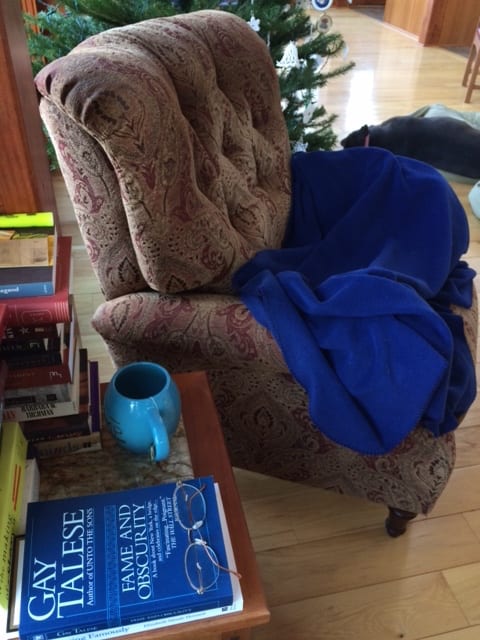 Zero degrees Farenheit. The official temperature in the valley below our mountain house yesterday morning. Keith and I didn’t go to church but not because of the weather. We both have colds.
Zero degrees Farenheit. The official temperature in the valley below our mountain house yesterday morning. Keith and I didn’t go to church but not because of the weather. We both have colds.
When I’m stuffed up, snuffling, hacking, and blowing my nose, I feel pitiful. Cranky. Unloveable. To avoid spreading germs to others, I stay home and curl up in my chair with a blanket, hot tea, reading glasses, and a book.
This past weekend, I hibernated with Gay Talese’s classic essay collection, Fame and Obscurity. Talese’s prose swept me back to the Sixties, my teen years, and the city of New York, two hours from the rural Connecticut town where I grew up. One “fame” essay in particular resonated: “Frank Sinatra Has a Cold.”
Talese wrote: “Sinatra with a cold is Picasso without paint, Ferrari without fuel – only worse. For the common cold robs Sinatra of that uninsurable jewel, his voice, cutting into the core of his confidence, and it affects not only his own psyche but also seems to cause a kind of psychosomatic nasal drip within dozens of people who work for him, drink with him, love him, depend on him for their own welfare and stability.” (173-4)
Seventy-five people were on Sinatra’s personal payroll when Talese wrote the essay in the mid-sixties. The well-being of many others hinged on Sinatra’s. He owned a film company, record company, private airline, missile-parts firm, real-estate, and more.
Frank Sinatra had the fame and fortune to have and do almost anything he wanted. Yet he was sick. More than that, anguish, depression, panic, and rage plagued him. He skulked around in silence.
Talese portrayed Sinatra, then approaching his fiftieth birthday, as a generous man who remembered people’s first names, picked out gifts personally, helped friends in need, and said, “thank you,” to autograph seekers. His career had had downs as well as ups.
Ol’ Blue Eyes could also be demanding, mean, rude, and arrogant. When he got tired of ego-burnishing love affairs and celebrity-fueled carousing, he’d slip into his first ex-wife’s home in Los Angeles and fall asleep on her sofa. She welcomed him as a friend, and he took good care of her. Despite this rare privacy, Sinatra always slept so he would wake in performance-ready clothes, creases sharp and crisp.
Although Frank Sinatra sang about life — New York, New York; My Way; It Was a Very Good Year — I wondered if he ever got to know his real self, which is not always fun.
As Richard Rohr stated in A Spring Within Us: A Book of Daily Meditations, “…the more you know about yourself, the more you are not impressed! But, as long as you’re being held and received by the Great I AM, all shame and unworthiness is taken away. We realize that this little I am that I am is what God has always loved anyway, even with all of its imperfections and silliness.” (391)
Obscurity, not the silliness of fame, privacy to be the little, imperfect I am that I am. What God loves anyway.
Even when I have a cold.



Enjoyable essay!!! Gay Talese has s new book (2017), Unfortunately, it appears to have some credibility issues which Talese acknowledges.!
Thanks, MJ! I read about the issues surrounding Talese’s The Voyeur’s Motel in a New Yorker article and quickly decided to give the book a wide berth.
Me too!